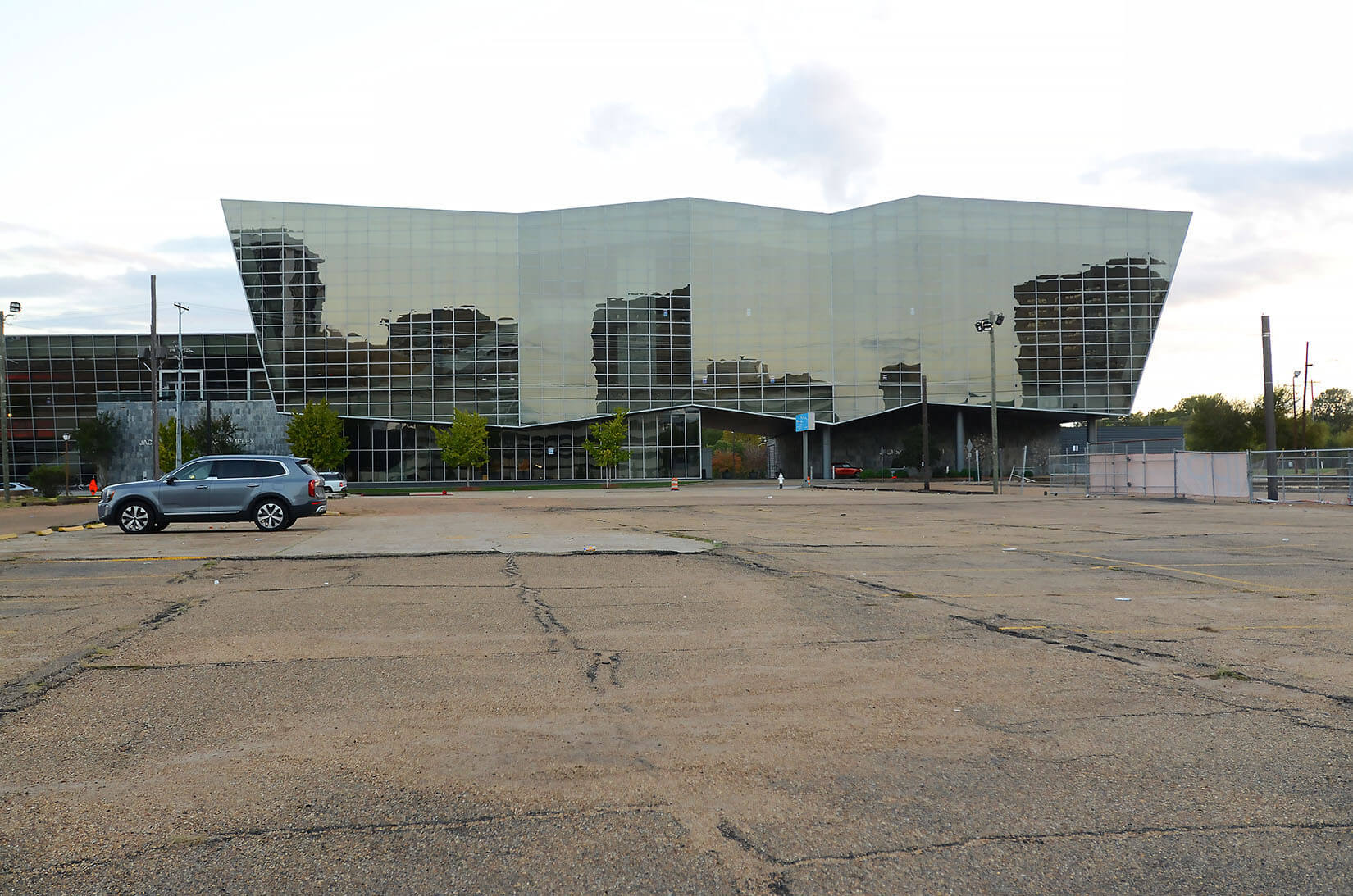

If it weren’t for Drake, a row of abandoned homes next to Jackson State University might still just be sitting there, slipping into disrepair.
About a month ago, two real estate investors from California bought them up – a deal facilitated by the city’s former planning and development director Jhai Keeton, who met the pair through connections he had made working on tour logistics for the Canadian rapper.
Keeton did this off the clock in part because he wanted to prove that something, anything, could happen in the economically stagnant city.
But if another developer tried to rehab the properties through a more traditional route – that is, by securing a bank loan – Keeton said they might be out of luck. In recent years, so few homes have sold in this area of Jackson, it’s impossible to get what’s called a “comparable,” a measurement of a property’s value that without, banks won’t issue a loan.
“It ain’t no comp because a bank ain’t financing any new thing to be built for somebody to buy,” said Keeton, who headed up the crucial city department for just a year.
In a city that struggles with poverty, low educational attainment and suburban competition, the lack of development justifies the lack of development, a paradox that has faced nearly every leader of the city of Jackson’s planning and development department in recent years.
“The rule of money often is that money goes where it can grow,” said Mukesh Kumar, a former professor of urban planning who led the city department from 2017 to 2019.
This problem isn’t going away any time soon, even as Jackson’s newly elected Mayor John Horhn had pledged to make the city more business friendly. His search for a new planning and development director has gone national, but with low salaries at City Hall, it might be hard to entice the leader Jackson needs to come work in the fastest shrinking large city in America.
When that’s the case, what can any one head of the city’s planning and development department even do to turn the tide? Former department heads agree – it takes gumption, social capital and a good deal of finagling to bring development to a city as statistically challenged as Jackson: High poverty rates, low property values and poor economic mobility.
“People are always like why don’t we have this, why don’t we have that,” said Jordan Hillman, who served as director from 2019 to 2022 and is now the chief data officer at JXN Water. “Well, it’s math.”
Historically, Jackson’s planning and development department has focused more on the process, pushing through zoning and permitting documents and writing comprehensive plans. That’s because most development in a city is led by the private market, not the government.
“Rarely do cities drive economic development,” said Chloe Dotson, who led the department from 2022 to 2024. “It’s questionable to even look at a city, and say, ‘well why isn’t a city pushing economic development?’ That’s not its job.”
The department’s goal, then, is to work to make a city’s conditions favorable for private development. When Kumar led the department, he said he tried to change its mindset from regulating to enabling, even as much of its work was purely administrative: issuing grants, conducting code enforcement or overseeing the bus system.
For big businesses that want to come to Jackson, Kumar said the planning and development’s role was to “get out of the way” or offer an incentive, like tax-increment financing, that could help them locate in the city while turning a profit.
But Kumar felt the department needed to do a better job of fostering the city’s small businesses.
“The businesses that are not making the market-driven decisions, they’re making the personal decisions,” he said. “They may not even know they need a business license.”
Dotson had a similar philosophy: “We can’t create demand, but we can shape it,” she said.
Keeton, whose background is in economic development, not planning, took somewhat of a different course. Starting at the city in 2020 as a deputy director in the department, Keeton said he wanted to fly the plane, not set the runway.
“I’m trying to get out of the abandoned group,” he said. “I’m at the bottom. I might make more money than my peers, but I’m trying to engage in power.”
He found his taste for big-picture ideas aligned with former Mayor Chokwe Antar Lumumba’s. The former mayor, who lost reelection last spring, found in Keeton a staffer who would prioritize a pair of long-held dreams: bringing a Top Golf and a Dave and Busters to Jackson.
“He was looking for some family-type of entertainment,” Keeton said.
Keeton quickly realized that Jackson’s math didn’t compute for attracting Dave and Busters. But Top Golf seemed more promising — especially if the city could make it happen at a site on Lakeland Drive, one of the busiest corridors in the state, in a part of Jackson where residents have more disposable income.
Though Keeton said the demographic data supported the project, state-owned institutions in the area opposed it. Top Golf ultimately went the way of other developments pitched for this particular site — to Madison County.
“There’s not really much you can do when the institution shuts you out,” Keeton said.
The day the news hit social media two years ago, Keeton was leaving Atlantic City. He said he texted Lumumba, “Mayor, I need you to help me to determine how to feel about this. He said ‘I feel just like you, I’m deflated, it sucks that we didn’t even get an attempt to play the game.’”
It seemed that everywhere Keeton turned in his department, something was out of his control. After a stint at the Mississippi Development Authority, Keeton returned to the city as director in 2024.
Could he bring a shopping center to downtown Jackson? “We don’t have an after five population in downtown Jackson,” he said.
Could he work with small businesses to help them meet Jackson’s regulations for storefronts in downtown Jackson? “We only have four, five inspectors for the whole city.”
Then there was “the famous RFQ,” he said.
The vacant lot across from the downtown Jackson Convention Center, the site of decades of failed development, was another task on Keeton’s plate.
But after the prospective hotel development became the center of an FBI corruption probe that led to federal indictments against Lumumba, the county prosecutor and two council members, Keeton said he couldn’t talk about the project because “it was political.”

He decided to do something different. Keeton said he asked himself, “What do we have the resources to do right now without waiting for a $100 million deal?”
A project known as “The Pulse at Farish Street” was born. The goal was to turn the lot into an outdoor space with a skate park and pickleball courts that would attract more people to downtown Jackson, to provide a justification for building another hotel in the future.
Then Lumumba lost reelection. Keeton got a text that Horhn would not be keeping him on as director. The new administration quickly announced it was abandoning The Pulse and turning the vacant lot into a “functional, upgraded parking area,” the Clarion Ledger reported.
Keeton has returned to his consulting firm, including working with One Voice, a civic engagement nonprofit born out of the state’s NAACP and headed up by Lumumba’s reelection campaign manager.
Keeton considers breaking ground at The Pulse to be one of his biggest accomplishments in his year leading the office. His other was working with the 1% Sales Tax Commission to unlock funds to repave the roads around the Northwest Industrial Park in northeast Jackson.
“That is a huge win,” Keeton said. “Site development is the name of the game.”
Creative solutions exist to combat Jackson’s data doldrums. In areas of the city that lack “comps”, Dotson said investors who are shut out from traditional lending could turn to programs like the low-income housing tax credit to help them build rental properties tenants can eventually own.
“I am not as pessimistic,” said Dotson, who is now the chief program officer at the HOPE Enterprise Corporation. “I believe that Jackson can do whatever it wants to do. It just has to have the correct leaders and it has to have the correct partnerships and the right people that know what they’re doing.”
The secret to overcoming a city’s bad math, Kumar said, is twofold: A mindset shift that can lead to “momentum.”
“It is real,” he said.
But a city’s priorities change when leadership turns over.
Recently, Kumar, who now works in planning in Waco, Texas, said he was looking at satellite images of Congress street in downtown Jackson, where he’d deployed a small grant the city received to build wooden benches, tables and an archway that became a popular destination for graduation pictures.
It looked like someone had already removed several of the pieces he’d built.